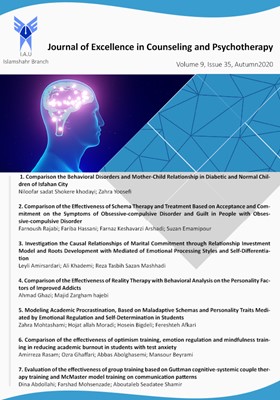Modeling Academic Procrastination, Based on Maladaptive Schemas and Personality Traits Mediated by Emotional Regulation and Self-Determination in Students
Subject Areas : Journal of Excellence in Counseling and Psychotherapy
Zahra Mohtashami
1
![]() ,
Hojat allah Moradi
2
,
Hojat allah Moradi
2
![]() ,
Hosein Bigdeli
3
,
Fereshteh Afkari
4
,
Hosein Bigdeli
3
,
Fereshteh Afkari
4
![]()
1 - PhD student in Educational Psychology, Islamic Azad University, North Tehran Branch, Tehran, Iran
2 - Associate Professor, Department of Psychology, University of Imam Hussein, Tehran, Iran
3 - Assistant Professor, Department of Psychology, Islamic Azad University, East Tehran Branch, Iran
4 - Assistant Professor, Department of Educational Sciences, North Tehran Branch, Islamic Azad University, Tehran, Iran
Keywords: personality, self-determination, Academic Procrastination, Emotional regulation, maladaptive schema,
Abstract :
Objective: Academic procrastination indicates a delay in academic activities that can be intentional, accidental or habitual and is related to several factors. The aim of this study was to predict academic procrastination based on maladaptive schemas and personality traits mediated by emotional regulation and self-determination in students.Methodology: The research method was descriptive-correlational. The statistical population of the study consisted of all female high school students in Tehran in 2009-2010. 350 students were selected by purposive sampling method and Solomon and Rothblom 1984 academic procrastination questionnaire, maladaptive schemas (Young, 1998), personality traits (McCurry and Costa, 1985), emotional regulation (Gross and John, 2003) and self-determination (Guardia, Desi and Ryan, 2000). Data were analyzed using structural equation modeling.Results: Based on the results of this study, the proposed model of causal relationships between the mentioned variables had an acceptable fit. In general, in the proposed research model, the results showed that maladaptive schemas and personality traits both directly and indirectly through emotional regulation and self-determination in female students with procrastination. They have an educational relationship. Also, the results showed that the relationship between emotional regulation and self-determination with academic procrastination in female students is negative and significant.Conclusion: It is recommended that educational psychologists and academic counselors develop a suitable educational program to reduce academic procrastination in students and teach them strategies to improve maladaptive schemas, personality traits, emotion regulation and self-determination.
_||_


